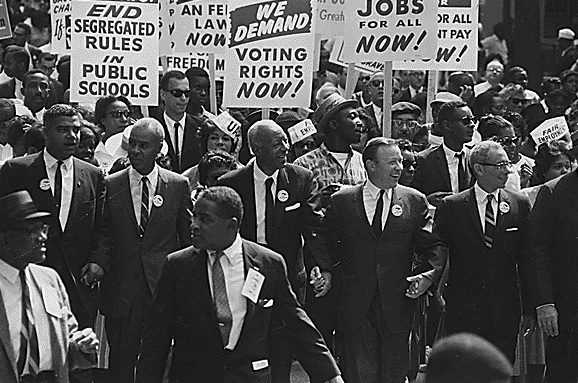Module 7: Socio-Political Philosophy
Section outline
-

(Image courtesy Rowland Sherman. Civil Rights March on Washington DC 1963 CC-0)
Socio-political philosophy is a branch of philosophy that delves into the complex interplay between society, politics, and human nature. It seeks to understand the fundamental principles that underpin social organization, the nature of power, justice, rights, and the role of the individual within the collective. By exploring the intricate relationships between individuals and society, socio-political philosophy aims to shed light on the ethical, moral, and practical dimensions of governance, social structures, and human interaction.
Key Concepts:
-
Social Contract Theory: Many socio-political philosophers, such as Thomas Hobbes, John Locke, and Jean-Jacques Rousseau, explored the concept of a social contract. This theory suggests that individuals come together to form a society by mutually agreeing to surrender certain freedoms in exchange for protection, order, and the benefits of communal living.
-
Justice and Equality: Socio-political philosophy extensively addresses questions of justice and equality. Philosophers like John Rawls introduced the idea of the "veil of ignorance," wherein societal arrangements should be made without knowledge of one's own position, ensuring fairness and equal opportunities for all.
-
Rights and Liberty: The nature and extent of individual rights and liberties within society are core concerns of socio-political philosophy. These rights may include freedom of speech, religion, and assembly, as well as property rights. The tension between individual freedom and the common good is often explored in this context.
-
Power and Authority: Philosophers like Michel Foucault and Hannah Arendt critically examine the dynamics of power and authority. They explore how power structures operate, how they influence institutions, and how individuals can resist or challenge oppressive systems.
-
Political Ideologies: Socio-political philosophy delves into various political ideologies, such as liberalism, conservatism, socialism, and anarchism. These ideologies offer differing perspectives on the role of government, individual rights, economic systems, and the distribution of resources.
-
Civil Disobedience and Revolution: The ethical boundaries of civil disobedience and the conditions under which revolution is justified are subjects of debate. Thinkers like Henry David Thoreau and Martin Luther King Jr. have explored the moral implications of resisting unjust laws.
-
Multiculturalism and Identity: Socio-political philosophy also engages with issues of multiculturalism, identity, and cultural pluralism. It addresses questions of cultural recognition, minority rights, and how societies can accommodate diverse perspectives.
Significance:
Socio-political philosophy is of immense significance as it prompts critical reflections on the structures and norms that shape our societies. It challenges us to question the status quo, consider alternative systems, and evaluate the ethical implications of our choices. By studying socio-political philosophy, individuals can gain a deeper understanding of the historical, philosophical, and ethical foundations that inform political decisions and social interactions.
In essence, socio-political philosophy invites us to engage in thoughtful discourse about the principles that guide our collective lives. It encourages us to examine the intricate web of power, justice, and governance, and to contemplate how our beliefs and actions contribute to shaping the societies in which we live. As you embark on your exploration of socio-political philosophy, you will encounter a rich tapestry of ideas that continue to influence our understanding of the world around us.
Upon completion of this module, you will be able to:
Comprehend the key concepts and philosophical ideas that underpin sociopolitical structures.
Examine the ethical and normative foundations of sociopolitical theories and their implications for justice, rights, and social change.
To achieve these objectives:
- Read the Module 7 Introduction
- Read Chapter 7 sections 42-50 Readings in Western Philosophy for Louisiana Learners
- Complete the assignment and discussion board.
Module Pressbooks Resources and Activities
You will find the following resources and activities in this module at the Pressbooks website. Click on the links below to access or complete each item.
-
Background Colour
Font Face
Font Kerning
Font Size
Image Visibility
Letter Spacing
Line Height
Link Highlight
Text Colour
